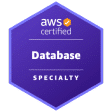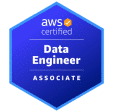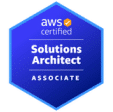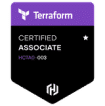Data-driven decision-making is becoming increasingly vital in today’s fast-paced business environment. This has led to a growing demand for efficient data management and analytics solutions – enter SingleStore and Snowflake.
As two leading platforms in the data warehousing and real-time analytics space, it’s crucial to understand their fundamental differences, strengths, and weaknesses to determine the best fit for your organization. Buckle up as we take you through SingleStore vs. Snowflake, comparing their features, architecture, data ingestion capabilities, developer tools, pricing, security, and more.
SingleStore vs. Snowflake Key Takeaways
- SingleStore and Snowflake specialize in different realms of data analytics, offering distinct capabilities for businesses to optimize their data management.
- Compute and storage separation is a crucial feature with both platforms, along with scalability & performance considerations when selecting the right database solution.
- Security & compliance are prioritized by SingleStore & Snowflake through encryption, role-based access control, auditing/monitoring capabilities & industry-standard certifications.
Understanding SingleStore and Snowflake: Key Differences
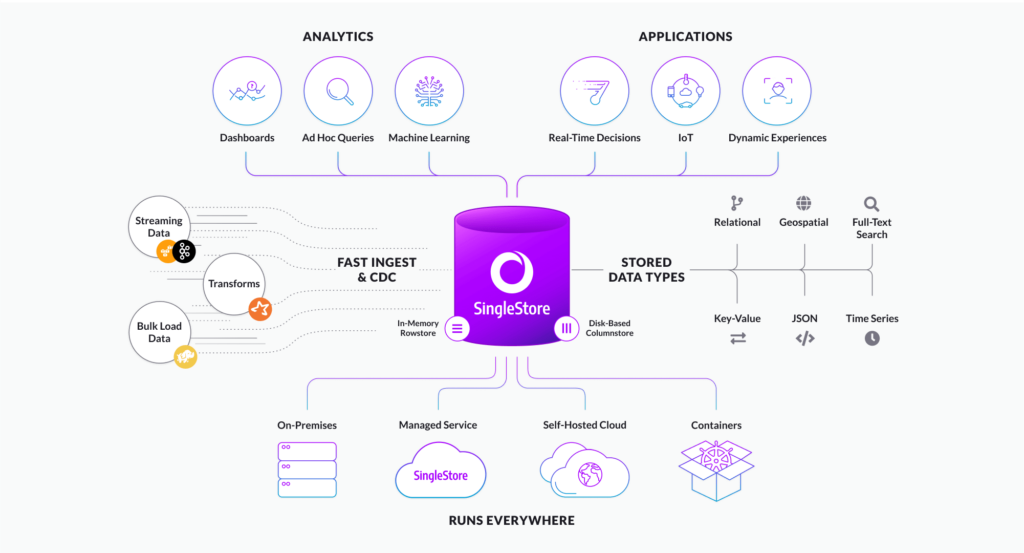
Regarding database solutions, SingleStore and Snowflake cater to different needs. SingleStoreDB, a cloud-native operational database, is designed for high performance, scalability, and powering real-time analytics and HTAP.
On the other hand, Snowflake is a cloud-based data warehousing solution, perfect for centralizing data, transforming it, and serving big data especially with advanced SQL functions.
So, if you need real-time analytics with fast queries and high concurrency, SingleStore might be your go-to choice. However, if your primary concern is data warehousing, Snowflake could be the better option.
Interestingly, supplementing Snowflake with SingleStoreDB can lead to rapid dashboards and intelligent applications. SingleStore is compatible with various data formats such as CSV, JSON, Avro, and Parquet, and its API allows developers to access and manipulate data programmatically. And with the release of Singlestore Kai, real-time for JSON just got a boost!
In terms of pricing, SingleStore’s highly scalable architecture includes:
- compute
- storage
- bandwidth
- technical support
Moreover, query performance improvements are immediately noticeable when running AI applications on SingleStore.
Data Warehouses and Real-Time Analytics
Assessing SingleStore and Snowflake requires a clear understanding of the difference between data warehouses and power real-time analytics, as well as the role of operational analytics. Data warehouses are optimized for managing and processing large volumes of structured and semi-structured data for large-scale data analysis and reporting.
In contrast, power real-time analytics focuses on analyzing data as it is generated, providing enterprises with immediate insights and enabling real-time decision-making. On the other hand, operational analytics helps organizations optimize their processes and improve efficiency by analyzing data from various sources.
SingleStore excels in real-time analytics, offering fast data processing and support for various data types. On the other hand, Snowflake has been explicitly designed for data warehousing, making it the ideal choice for businesses with large-scale data storage and reporting needs.
Data Scientists and Analytical Workloads
Regarding target user bases, SingleStore and Snowflake serve different purposes. SingleStore is geared towards data scientists and analytical workloads, offering rapid data processing, scalability, and support for various data types.
Snowflake, however, is designed for a broader audience, boasting a cloud-native architecture, integration with other cloud services, and support for various data formats.
In conclusion, SingleStore might be the better choice if you’re a data scientist and your primary concern is analytical workloads. However, if you require a comprehensive platform that caters to a broader range of users, Snowflake could be the more suitable option.
Architectural Comparison: SingleStore vs. Snowflake

In terms of architecture, SingleStore and Snowflake differ in their approach. SingleStore’s straightforward and uncomplicated architecture facilitates rapid analytics, providing high performance and scalability. On the other hand, Snowflake is a single-workload environment that is particularly well-suited for data warehousing.
Although both platforms excel in data warehousing, SingleStore offers a more streamlined and efficient architecture for expeditious analytics.
Businesses aiming to optimize their data management and analytics capabilities must grasp SingleStore and Snowflake’s architectural differences. In the following subsections, we’ll delve deeper into the differences in compute and storage separation, scalability, and performance.
Compute and Storage Separation
Compute and storage separation is a vital feature that enables users to manage and scale compute resources independently from storage resources, providing low-latency ingest and query capabilities with elasticity and unlimited storage.
SingleStore leverages cloud object storage for compute and storage separation, offering flexibility to adjust compute capacity based on usage needs. Its pricing is calculated according to the amount of compute and storage used. This structure ensures users are only paying for what they use.
On the other hand, Snowflake considers computing and storage separation as a core feature, allowing for low-latency ingest and query capabilities while providing elasticity and unlimited storage.
Although both SingleStore and Snowflake utilize compute and storage separation, their approaches differ, and these distinctions can impact scalability and performance.
Scalability and Performance
When selecting a database solution, scalability and performance are key considerations. Scalability refers to a system’s ability to accommodate increasing data, users, and workload without compromising performance. Performance, conversely, pertains to the speed and efficiency with which a system processes and produces results.
While both SingleStore and Snowflake offer scalability and performance capabilities, their particular differences may depend on factors such as architecture and query optimization techniques.
SingleStore focuses on real-time analytics and high concurrency, providing faster query processing and more efficient data access. Snowflake, in contrast, emphasizes data warehousing, enabling efficient storage and retrieval of large amounts of data.
Each platform addresses different needs, and grasping their scalability and performance capabilities is vital to choosing the appropriate solution for your business.
Data Ingestion and Integration Capabilities
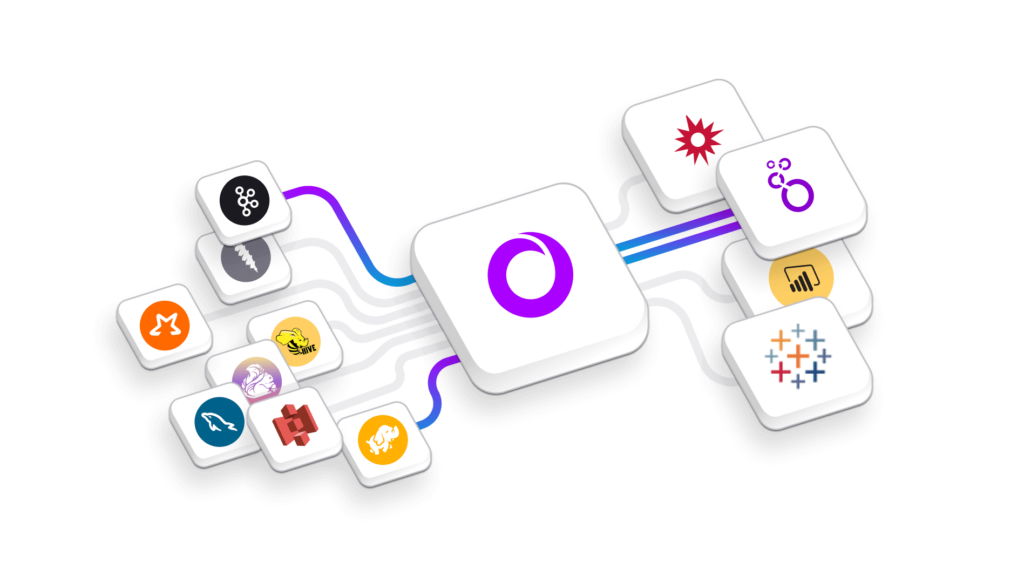
The efficacy of a database solution for your organization significantly depends on its data ingestion and integration capabilities. SingleStore offers a JSON data type and supports data ingestion from sources like Apache Kafka and Amazon S3.
On the other hand, Snowflake relies on the modern data stack ecosystem, providing capabilities for large-scale data ingestion and concurrent analytics.
The upcoming subsections will clarify the differences between SingleStore and Snowflake concerning:
- Data formats
- Types
- Integrations
- Ecosystems
This will assist you in making an informed decision about the suitable database platform for your needs.
Data Formats and Types
SingleStore and Snowflake support different data formats and types, affecting their integration capabilities. SingleStore is compatible with CSV, JSON, Avro, and Parquet files, allowing for seamless integration with various data sources. SingleStore offers two storage formats.
First, there is a rowstore for general purpose use. Second, there is a columnar store called universal storage; this format is optimized for analytical workloads and databases.
Snowflake is compatible with most standard SQL data types for columns, variables, expressions, and parameters, making it a versatile solution for organizations with diverse data needs. Knowing both platforms’ data formats and types is key to identifying the most suitable option for your organization.
Integrations and Ecosystem
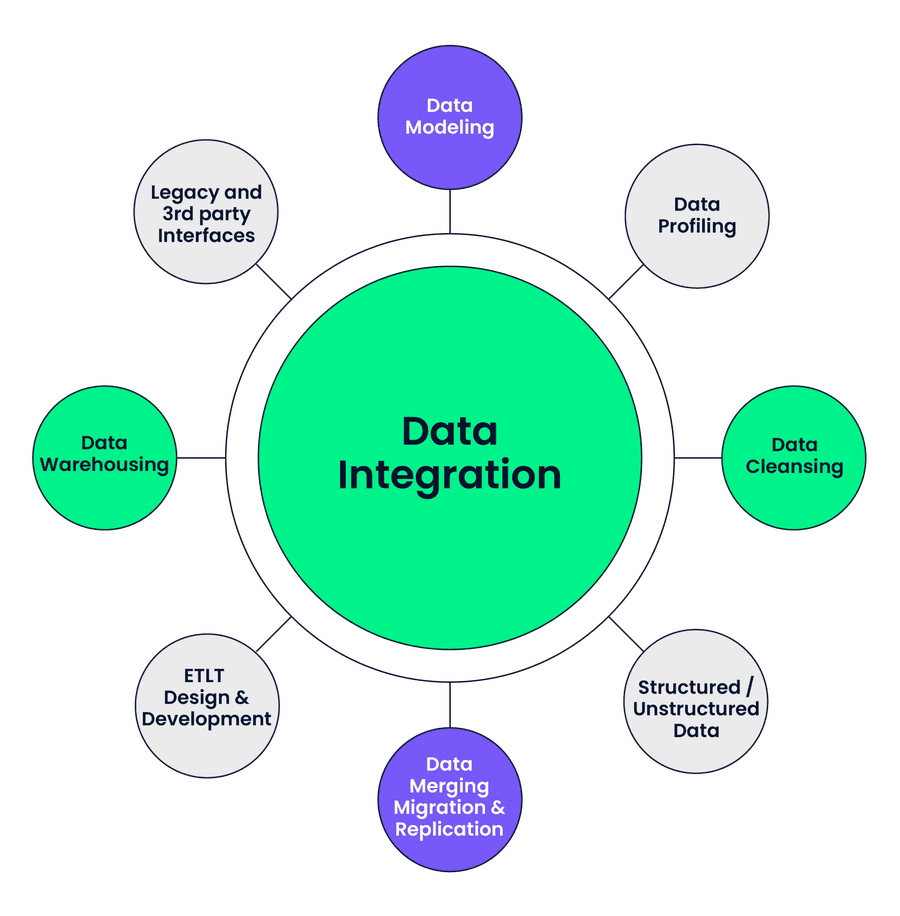
Both SingleStore and Snowflake offer various integrations to enhance their capabilities. SingleStore provides native features such as SingleStore Pipelines for real-time data ingestion and transformation from external sources and open-source integrations with Apache Spark.
On the other hand, Snowflake boasts a comprehensive ecosystem compatible with a broad range of industry-leading tools, providing integration capabilities with numerous partners to facilitate users in connecting and integrating with different systems.
Ultimately, the integrations and ecosystems offered by both platforms significantly influence the choice of the most fitting database solution for your organization.
Understanding the integration options available with SingleStore and Snowflake can help you make a more informed decision.
Querying and Developer Tools
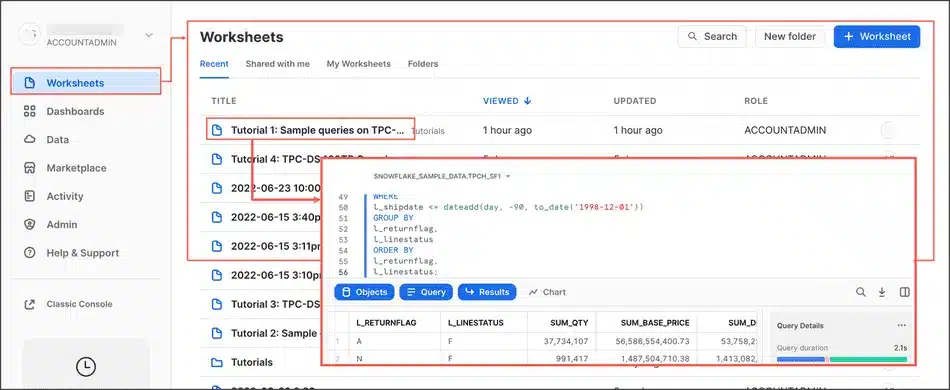
When selecting a database platform, it’s imperative to consider querying and developer tools. Both SingleStore and Snowflake support SQL as their native query language, offering a range of integration options.
Snowflake recently released Snowsight, an enhanced UI that allows the user not only to write SQL, and Python, but also generate dashboards. It’s not tableau, but it might be enough for simple reporting.
SingleStoreDB Studio is a visual user interface that allows you to interact with all your SingleStoreDB Clusters. It is designed to be lightweight, easy to deploy, and easy to upgrade.
Studio provides the tools to maintain cluster health without the overhead of complex, heavyweight, and error-prone client software. It turns user actions into standard SQL queries that are run against your SingleStoreDB Cluster.
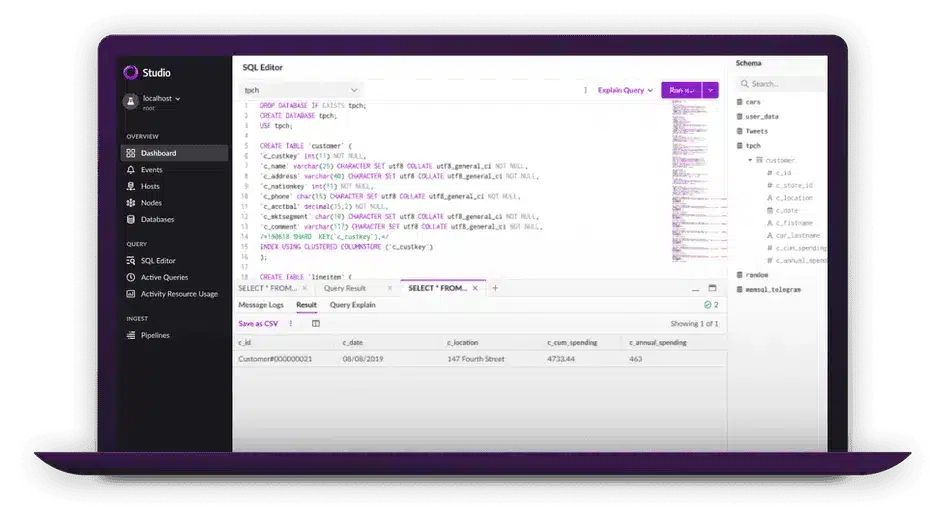
In the following subsections, we’ll delve deeper into SQL support and query language, as well as APIs and developer tools, to provide a comprehensive understanding of the querying and developer tools available with SingleStore and Snowflake.
SQL Support and Query Language
As mentioned earlier, SingleStore and Snowflake support SQL as their native query language. SingleStore is designed to query structured data with static schemas and supports SQL joins. On the other hand, Snowflake is a cloud-based data warehousing service that accommodates structured and semi-structured data, offering similar SQL syntax and remote access capabilities.
It’s vital to understand both platforms’ SQL support and query language capabilities when selecting the ideal database solution for your organization. Analyzing these features can help you determine which platform aligns best with your business requirements and data needs.
APIs and Developer Tools
APIs and developer tools play a significant role in the usability and capabilities of a database platform or software. SingleStore offers various APIs, such as RESTful APIs and client libraries, allowing developers to access and manipulate data programmatically.
These APIs enable developers to integrate SingleStore into their applications and perform data retrieval, insertion, and updates.
On the other hand, Snowflake provides SQL APIs, UDFs (User-Defined Functions), and drivers to facilitate application development. These tools enable developers to interact with the Snowflake database, write SQL queries, and analyze and build applications that leverage the data stored in Snowflake.
To ensure smooth integration with your existing systems and applications, it is vital to compare the APIs and developer tools of both platforms and analyze API screenshots to visualize their functionality.
Both platform are working hard to provide python support and recently AI integration. Singlestore has some interesting demos about how to leverage ChatGPT and build LLM Apps that can see, hear, and speak.
Pricing and Business Considerations
When selecting a database solution, it’s essential to consider pricing and business considerations. Here are some key points to consider when comparing SingleStore Cloud and Snowflake:
- SingleStore Cloud pricing is tailored to fit individual needs and is based on computing and storage usage.
- In some instances, SingleStore offers a lower total cost of ownership than Snowflake, providing a more economical option for businesses.
- However, it’s essential to consider both platforms’ specific price-performance comparisons and industry-specific use cases to make the right choice for your organization.
In the following subsections, we’ll explore price-performance comparisons and use cases for SingleStore and Snowflake, providing a clearer understanding of the pricing and business considerations involved in choosing the right database platform.
Price Performance Comparison
SingleStore and Snowflake have different pricing models, with SingleStore focusing on real-time analytics and Snowflake on data warehousing. However, a third-party study has indicated that SingleStore offers:
- 50-60% lower total cost of ownership (TCO) than Snowflake
- 50-60% lower TCO than Redshift
- 50-60% lower TCO than MySQL
- 50-60% lower TCO than PostgreSQL.
Recent third-party TPC benchmarks reveal that when you compare SingleStore to Snowflake, SingleStore offers 23% higher TPC-H performance and 15% better price performance. Comparing price performance is vital to determine which platform offers the best value for your organization.
Use Cases and Industry Solutions
Both SingleStore and Snowflake cater to various use cases and industries. SingleStore is an ideal solution for data-intensive applications, such as real-time analytics, machine learning, and streaming data, as well as operational workloads, such as online transaction processing (OLTP) and data warehousing.
Snowflake, on the other hand, is optimal for data scientists and analytical workloads, providing an efficient platform for data warehousing, analytics, and data lake applications. SingleStore offers tailored solutions for various industries, including retail, healthcare, financial services, and others, featuring data security, scalability, and performance.
Snowflake provides similar industry-specific solutions, ensuring that both platforms cater to the unique needs of various industries.
Security and Compliance

Any database solution must prioritize security and compliance measures, and both SingleStore and Snowflake do so. They provide the following data security features and compliance certifications, ensuring that customer data remains safe and transactions are secure.
- Encryption at rest and in transit
- Role-based access control
- Auditing and monitoring capabilities
- Compliance with industry standards such as GDPR and HIPAA
In the following subsections, we’ll delve deeper into the data security measures and compliance certifications offered by both SingleStore and Snowflake, helping you decide which platform best meets your company or organization’s security and compliance requirements.
Data Security Measures
Both SingleStore and Snowflake prioritize data security, implementing various measures to protect user data. Some of the security features offered by SingleStore include:
- Encryption at rest
- Authentication
- Authorization
- Role-based access control
- Secure storage layer that encrypts data at rest and in transit
- Detailed audit logs to track user activity and ensure data security
These features ensure the highest level of data protection for users.
Snowflake provides the following data security features:
- Encryption at rest
- Authentication
- Authorization
- Role-based access control
- Dynamic data masking
- End-to-end security
Both platforms leverage cloud security technologies and offer best practices for securing data, ensuring customer data remains protected.
Compliance Certifications
Compliance certifications are essential in guaranteeing that companies adhere to industry standards and regulations, safeguarding customer data, and ensuring that they operate under the law. SingleStore and Snowflake hold certifications such as SOC 2, HIPAA, and GDPR, ensuring their data is secure and they adhere to industry standards and regulations. Notably, Snowflake also holds the ISO 27001 certification, which SingleStore does not have.
Knowing the compliance certifications of both platforms is crucial for choosing the appropriate database solution for your organization. Analyzing these certifications can help you determine which platform aligns best with your organization’s security and compliance requirements.
Summary: SingleStore vs. Snowflake
| What You Care About | SingleStore | Snowflake |
| Primary Strength | Combines real-time streaming and analytics in one high-performance engine. | Market-leading cloud data warehouse built for scalable, batch-oriented analytics. |
| Ideal Use Case | Real-time dashboards, hybrid workloads (OLTP + OLAP), and latency-sensitive applications. | Historical analysis, big data batch queries, and complex BI workloads at scale. |
| Architecture | Single engine supporting transactional + analytical processing (HTAP). | Decoupled storage and compute, designed purely for analytical (OLAP) use. |
| SQL Support | Full ANSI SQL across streaming, transactional, and analytical queries, including JOINs and window functions. | Excellent SQL support, especially for analytical queries; strong ecosystem of connectors. |
| Pricing Transparency | Offers flexible pricing and resource control, helping teams avoid overages. | Credit-based consumption model — powerful but potentially difficult to predict at scale. |
| Target Audience | Teams that need both speed and versatility: fintech, gaming, IoT, and operational analytics. | Data teams focused on large-scale reporting, warehousing, and machine learning pipelines. |
We’ve taken a comprehensive journey through SingleStore and Snowflake, comparing their features, architecture, data ingestion capabilities, developer tools, pricing, security, and more. Both platforms are powerful database solutions that cater to different needs and industries. SingleStore excels in real-time analytics and high concurrency, while Snowflake shines in data warehousing and analytical workloads.
Ultimately, the right choice for your organization will depend on your specific requirements and goals. By understanding the key differences and similarities between SingleStore and Snowflake, you’ll be better equipped to decide and choose the best database platform for your organization’s data management and analytics needs.
Frequently Asked Questions
What is the difference between the SingleStore database and Snowflake?
SingleStore Cloud is based on compute and storage usage, while Snowflake separates them for better price performance.
Snowflake is built specifically for the cloud, making it an ideal data warehouse solution.
Why choose SingleStore?
Choose SingleStore for its combination of relational database features and cloud-native architecture, as well as its ability to supercharge ML and analytics use cases.
Plus, enjoy patented Universal Storage for improved performance and data availability.
Is SingleStore a database?
Yes, SingleStore is a database. It is a distributed, relational SQL database management system with ANSI SQL support, and it can be deployed instantly on-demand in the cloud or on any of your infrastructure.
Who are snowflakes competitors?
Snowflake’s top competitors in the Data Warehousing market are Amazon Redshift, SAP HANA, Google BigQuery, SQL Server, MongoDB Atlas, Oracle Database, Teradata Vantage, Db2, OpenTextTM VerticaTM, Druic, and Databricks Lakehouse Platform.
How do SingleStore and Snowflake handle compute and storage separation?
SingleStore and Snowflake handle compute and storage separation differently, with SingleStore leveraging cloud object storage and workspace and Snowflake utilizing separate virtual warehouses.




